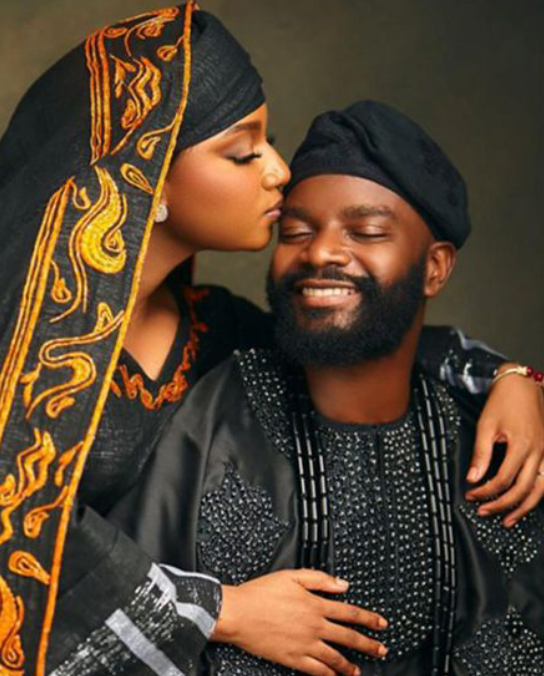
Leo Dasilva Claps Back as Customer Tries to Belittle Wife, Maryam: “She Always Had Her Own Voice”

In a viral social media exchange that has captured the attention of thousands of Nigerians online, reality TV star and entrepreneur Leo Dasilva publicly defended his wife, Maryam, after a customer attempted to belittle her achievements and attribute her success solely to her husband’s influence. The confrontation, which unfolded on Twitter, has sparked conversations about gender, success, and recognition in relationships, as well as the audacity of some who assume they can diminish another person’s accomplishments without consequence.
The online drama began when a Twitter user sent a direct message to Maryam that was, by all accounts, both dismissive and condescending. The message read: “My money is long,” followed by an attempt to belittle her agency. The sender added, “But it's your husband's money. Your husband empowered you. You only have a voice because your husband gave it to you. Be grateful to that man and stop acting like you are some woke supporter of women. You are only here for engagements please stfu.”
This message, brazen in its assumptions and tone, struck a nerve. Rather than letting it slide, Leo Dasilva, known for his social media presence and sharp wit, chose to respond decisively. In a series of tweets that have since gone viral, he made it clear that the insinuations were not only false but deeply insulting.
“You’re actually dangerously trying to belittle my wife,” he wrote. “She has two master’s degrees! She will be employed till she chooses not to be! She always had her own voice even before she got married to me! She was already working when I met her. She is more than enough for me.”
Leo’s response was more than a defense—it was a declaration of his wife’s independence and achievements. By highlighting Maryam’s educational background and career trajectory, he dismantled the unfounded notion that her success is solely tied to her husband. In fact, he pointed out that Maryam’s own professional accomplishments outshine even his, emphasizing her contributions across civil, corporate, and family spaces.
“She has put in a lot of work in the civil space, corporate space and family space. Na all-rounder,” Leo added, underscoring the multifaceted nature of his wife’s capabilities. His statement reflects a growing awareness in society about the importance of recognizing women’s achievements on their own merits, rather than attributing them to male counterparts.
The exchange has not only drawn attention to the individual merits of Maryam but also highlighted the role of social media in defending personal integrity and challenging sexist assumptions. In an era where online interactions can quickly turn toxic, Leo’s measured but firm response serves as a model for how to address baseless criticism and stand up for loved ones.
While some social media users might expect a defensive or dismissive response in such situations, Leo chose to be both assertive and informative. By listing Maryam’s credentials and contributions, he created a narrative that left little room for further disrespect. “We are grateful to God for his blessings,” he concluded, reminding the audience that their success is also rooted in faith and hard work, not entitlement or coincidence.
This incident has sparked broader discussions about the perception of women’s independence in Nigerian society and beyond. Too often, women are subjected to unsolicited opinions about the legitimacy of their accomplishments, especially when their partners are well-known or successful. The idea that a woman’s professional achievements can be reduced to the influence of her spouse is a stereotype that Leo and Maryam have decisively challenged.
The reactions to Leo’s tweets have been overwhelmingly supportive. Many social media users applauded his defense, praising him for publicly honoring his wife’s intelligence, diligence, and career achievements. Comments ranged from admiration for Maryam’s accomplishments to commendations of Leo’s approach, which combined factual defense with emotional support.
One of the key takeaways from this viral moment is the importance of recognizing and celebrating the achievements of women without undermining their agency. Maryam’s story is a testament to what many women experience: balancing personal ambition with professional success, often under the scrutiny of societal expectations. The ability to stand firm in the face of belittlement is not just empowering for the individual but also sets an example for others who may encounter similar challenges.
Moreover, the exchange sheds light on the impact of jealousy and assumptions in online interactions. The initial message directed at Maryam reflects a mindset where some individuals believe they have the right to diminish others’ accomplishments. By responding publicly and with clarity, Leo Dasilva not only defended his wife but also sent a broader message that such attitudes will not be tolerated.
Interestingly, the exchange also underscores the evolving dynamics of marriage in modern society. Couples like Leo and Maryam exemplify partnerships where mutual respect and recognition of each other’s achievements are central. Rather than conforming to outdated gender norms, they demonstrate that successful marriages can be built on equality, encouragement, and shared pride in one another’s successes.
Leo’s closing remark, “If you are jealous, Ogun go kM you,” added a cultural touch that resonated with his audience, blending humor, seriousness, and a subtle warning to anyone thinking of belittling others. It was a reminder that online commentary carries real-world consequences, especially when it crosses into personal attacks.
As the story continues to circulate online, it is likely to inspire discussions about women’s empowerment, the importance of acknowledging individual accomplishments, and the ways in which couples can publicly support each other. In a digital age where personal attacks and belittlement can spread rapidly, moments like these provide a blueprint for addressing false narratives with confidence and clarity.
Ultimately, this viral exchange is more than a social media skirmish—it is a reflection of the ongoing struggle for recognition and respect that women face every day. Maryam’s achievements, now firmly defended and highlighted by her husband, stand as a testament to what can be accomplished through dedication, education, and self-belief. Leo’s defense shows that supporting your partner is not just about words but about actively recognizing and celebrating their worth, even in the face of public scrutiny.
The conversation has sparked renewed interest in discussions about gender equality, the importance of personal agency, and the need to challenge outdated perceptions. For Maryam and Leo, it has also become an opportunity to set the record straight, celebrate their shared accomplishments, and remind the public that success is a product of hard work, talent, and determination—not merely marital association.
As social media continues to shape public discourse, moments like this serve as powerful reminders that audacious or disrespectful comments can—and should—be met with informed, respectful, and assertive responses. Maryam’s achievements, defended by a proud husband and recognized by thousands of supporters online, are a clear message: women’s accomplishments deserve acknowledgment, respect, and celebration—no excuses.
In the end, Leo Dasilva’s public defense of Maryam is not just about setting boundaries against a disrespectful message; it is a celebration of competence, education, and independence. It reminds us all that success is personal, earned, and worthy of recognition, and that those who try to belittle it are only revealing their own insecurity. As Maryam continues to thrive in her career and personal life, her story will serve as inspiration for women everywhere—and a warning for those who underestimate them.


